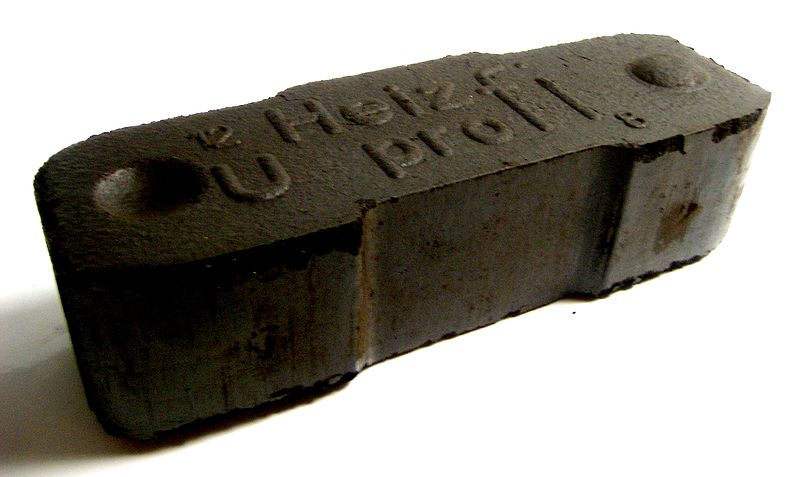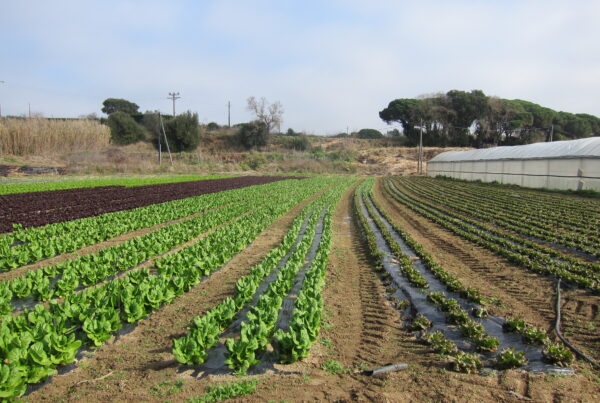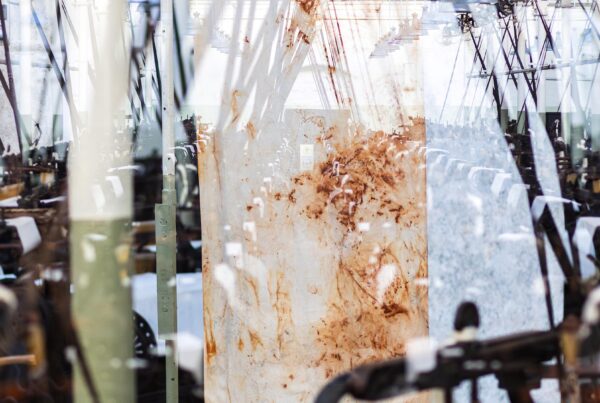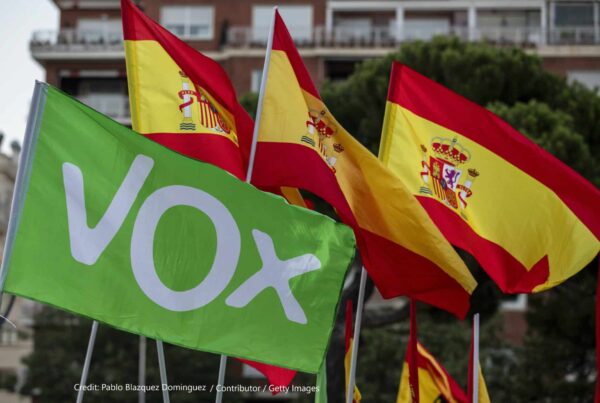By Marc Herbst*
A reflection on how meaning is organised in relation to objects gathered at recent climate events. Or, how things stay in motion until the system changes.

Whale pin and a pin of the country of Wales found at the Paris COP21 conference hall. Image credit: author.
Ultimately, it was because the interior of the Paris COP21 Summit’s conference hall looked similar to the train I’d arrived on that it took quite a studied eye to recognise these pins as something of value.
Though I’ve left a place where, because of relationships, I fell into the habit of gathering innately meaningful stuff, I still think of myself as collector. Or better put, I imagine that I should be one. You see, I used to co-organise the radical archive for the city where I lived. I’d ended up in the trusted position of archiving the cast-off ephemera of a slice of the region’s political commitments (posters, protest posters and hand-drawn placard, but also steel lock-boxes from a direct action that never happened) and community works (the prize object was a set of slightly demented street signs used as discussion pieces to get the neighbourhood talking about issues).
Since leaving that city, the archive has found its way into a couple of cardboard boxes I left scattered across the globe. I’m only now slowly reeling in that logistical chain. This logistics metaphor has come in useful when thinking about activists’ political formations. The metaphor talks about the scale of social relations and the way they are embedded in larger systems. It’s meaningful beyond activist culture, and that’s a good thing because it suggests a shared symptom rather then just some disease endemic to the left. Thus, I saw in these pins the whole of the conference hall. They’d encompassed what this larger system had marshaled together at a show of making the world a better place. “How delightfully banal”, I thought, “a whale pin and a pin from the country of Wales!”

Deutsche Bahn train interior. Image credit: Sebastian Terfloth.
My friend Ben and I tried to sneak into the Paris conference’s plenary session– we played dumb and were pointed towards a hall open to the general public. We got separated at the light security screening and met up on the other side, at the organic coffee stand. We walked past a table selling grow-your-own mushroom kits and tables where NGOs were selling memberships. A global health NGO had set up a portable massage table. Amidst a stack of pamphlets celebrating the connection between free trade and the environment I found the whale pin. Obviously, the Wales pin was from the country of Wales’ stand. The realisation dawned on me that this COP21 hall was exactly like the high-end health and beauty section at the Whole Foods Market. Though I never had the illusion that it would be otherwise, I felt a sudden sense of sadness that the summit was not re-orienting the globe towards some shockingly different but shockingly necessary course. Rather, the dominant market structures that we rode in on would be the ones that we ride out on, too, at least according to the dominant forces in Paris 2015.

A coal briquette, similar to what some local residents were passing out to anti-coal protesters. Image credit: unknown, creative commons license.
So, when I was at the 14 May 2016 climate march in Welzow/Lausitz and was handed bricks of coal by this coal-mining town’s residents, I was kind of confused. Yeah, I know, it was an attempt to take the piss out of us protesters. But it didn’t make much sense. I was like, “Yeah, we know you all work these strip mines. And yeah, we know coal runs the power plants and helps ruin the environment. And no, we protesters don’t recoil from the stuff like the apocryphal vegan does from steak. We have a sense of levity.” I know that seems I’m some activist summit-hopper – trust me. I’m not. I just realised that if I don’t go to these things, they’ll pass without me knowing what they were like. So I’ve re-found some activist commitment.

A march at the May 14th Ende Gelände protests to stop coal mining and to close the Schwarze Pumpe, Laustiz and Welzow, Germany. Image source: Bund-Sachsen.de
Moreover, I’m based in Germany right now and the train system easily gets you where you need to go. Welzow is out there as far as Germany goes–in the remains of the heavily industrialised former East Germany. By train you travel through reclaimed forest, rotting factories and pristine gems of modern infrastructure that maintain in a neoliberal manner the workways of the past. Lower wages here are said to keep jobs in the region, jobs a political system wants to preserve despite Germany’s celebrated green transition.
Along the sides of the protest march stood men in groups at the edges of gardens, passing coal bricks into the lane. The coal stood in thigh high piles. I wish I had photographs to share. I wish I had photos of the younger men excitedly peering out of the cracking windowsills of the old union hall, blasting creaky marching songs as we passed by from a souped-up stereo system–five or so speakers arranged at us to maximise the sonic attack. The locals were putting a great show for us; I mean this sincerely. They seemed totally sincere in their antagonism: while we were there to save the planet they were there to save their jobs, jobs based in the ever expanding coal field.
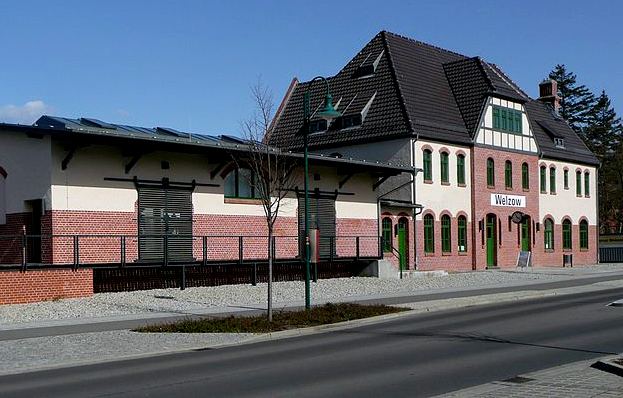
The old train station in the coal mining town of Welzow. Trains no longer arrive at the station, though it’s used as a centre for the region’s coal-mining tourist economy. Image source: mdb.8.
The coal is burned for the nearby power plant, the Schwarze Pumpe, where other activists were currently occupying. The plant needs to be fed and the coal that lies below Welzow will have to be eventually dug up. I was told that in order to do so these towns will move a few kilometres away. It has happened before, and it is being planned to happen again. Many residents agree with this potential future displacement.
The German word kohle (coal) is slang for money in Saxony, where I currently live. And though gifting the coal to the march is ambiguous, it’s a sacrifice they can afford, for locally the earth has been generous to them. If there were actually a global transition away from climate burning habits, protests like ours at Welzow wouldn’t be necessary– a legally binding agreement in Paris would have normalised a way for communities like this to just move away from coal. So its understandable that because caring isn’t in the ethic of the current concurrence, the locals take sensible action: that evening some residents reportedly snuck to the power station to attack the occupation in effort to force them out.
Its not that I think they’re right to do so– they’re not. But the distance between my activist’s idealism and the villagers’ daily experiences with coal is large. On special occasions I ride the train to the coal fields while their lives are continually made real because of its existence. My recently strengthened activist commitment celebrates an antagonism to these normalised social relations, against a sustainability that maintains the relations of a high end super market– even as my activist commitment feels like a storage container I can righteously unpack and send to work. At least in the displacement of my activist passion, a sense of humour fills the gaps. It’s funny ‘cause its kind of sad.

Snow globe filled with dirty river water, handed out on the May 14 anti-coal march in Welzow. Image source: author.
This is a photo of something truly awesome I picked up on the Welzow/Lausitz march. Local kids and their parents streamed within the march handing out these snow globes to fellow protesters. It’s kind of just a globe filled with the region’s dirty river water. I had to keep one. I could say that these globes act like a metaphor for how activism and climate change asks us to step into the murky space of the unknown where there is not yet a manageable form for political desire. But the globes actually just demonstrate how mining muddies up the local rivers and makes the beautiful difficult to see, which isn’t exactly the metaphor I wanted to read in them.
* Marc Herbst is a co-editor of the Journal of Aesthetics & Protest, an artist and writer. He is currently a PhD candidate at the Goldsmiths Centre for Cultural Studies.


